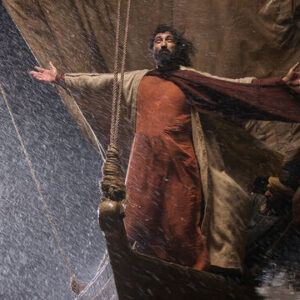 It’s wonderful that the Lord provides so many Bible stories that fascinate our children. There are certain accounts they love to hear again and again. Stories like Noah and the flood, David and Goliath, Daniel in the den of lions, and the three men in the fiery furnace are all favorites of children’s picture books. The danger of course is that the stories become so familiar that the real message is sometimes overlooked. Such could be the case with Jonah and the big fish.
It’s wonderful that the Lord provides so many Bible stories that fascinate our children. There are certain accounts they love to hear again and again. Stories like Noah and the flood, David and Goliath, Daniel in the den of lions, and the three men in the fiery furnace are all favorites of children’s picture books. The danger of course is that the stories become so familiar that the real message is sometimes overlooked. Such could be the case with Jonah and the big fish.
The story of Jonah is far more than a man learning an important lesson after finding himself in a rather uncomfortable situation. The true message of this book becomes apparent some time after that incident takes place, for it is later that we see prejudice and bigotry exposed to the point that nearly destroys this man of God
Jonah was a prophet, and perhaps a good prophet at that. He served the people of the Northern Kingdom during the reign of King Jeroboam II. As a true patriot, Jonah often preached against the sins of the heathen nations, including the people of Nineveh (located today in Iraq). Can you imagine his surprise when the Lord told him to go to those very people and preach to them the good news of salvation? This assignment was completely out of bounds. Weren’t prophets intended for God’s people and not for the enemy? That’s why Jonah boarded a ship heading west when Nineveh was east. We know the story well. First there was a storm, then there was a confession, then there was a splash, a fish, and a prayer. When we begin reading chapter three of this four-chapter book, we find ourselves once again at square one: God told Jonah, “Go to the great city of Nineveh” (3:1).
The miracle of the big fish was far overshadowed with the greater miracle of an entire city of perhaps 100,000 lost souls being converted at one time. And it was that miracle that pushed Jonah over the edge. That mass conversion shocked the prophet, and his true nature burst out when he declared, “O Lord, is this not what I said when I was still at home? This is why I was so quick to flee to Tarshish. I knew that you are a gracious and compassionate God . . . who relents from sending calamity. Now, O Lord, take away my life, for it is better for me to die than to live” (4:1-3). Jonah didn’t run from Nineveh because the task was too dangerous. He didn’t flee because he didn’t want to deliver bad news. He ran because he was afraid that God would show mercy on the people Jonah hated. He knew God was compassionate, and he did not want to see the results. Jonah’s hypocrisy was finally exposed. He despised God’s compassion!
Where does that put us? How do we fit into the story of Jonah? Do we rejoice that we are forgiven but withhold that same forgiveness from those we don’t feel deserve it? How do we forgive and approach a certain individual who has harmed us; an enemy nation that wars against us; a race of people we are uncomfortable being around; or the rich, gay, or poor people who live next door? Whose names are on the list of people we ignore? Do we sometimes wish certain people might not even darken our church doorways because they dress too casually, are dirty, poor, or foreign? Who lives in our Ninevehs?
The best thing we can learn about Jonah is that we don’t want to be like him. Instead, we should pray that we might be more like Jesus, who ate with sinners, healed the outcast, and was a servant of all. His death on a cross universally covered the sins of everyone, without exception. That is the pattern we should follow, or as Paul said, “There is neither Jew nor Greek, slave nor free, male nor female, for you are all one in Christ” (Galatians 3:28).
Prayer thought: Ask God to give you a heart that sees all people the same.
(From the book “Real People: Meditations on 101 People of the Bible” by Reynold R. Kremer)
